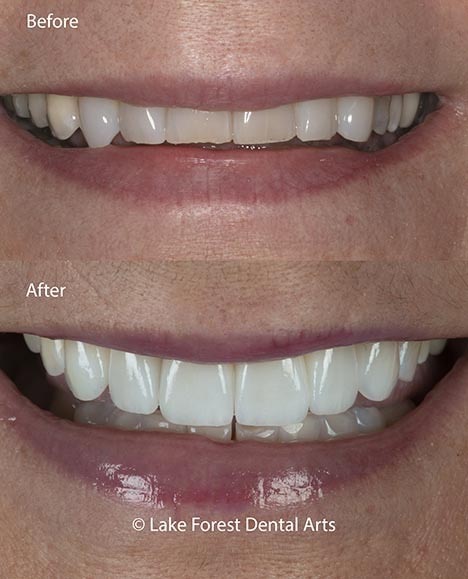
Do you wake up with jaw or facial pain or suffer from frequent headaches? Does your jaw pop or click when you open your mouth? Has nighttime grinding worn your enamel down or caused damage? If you said yes to any of these, you and your oral health might benefit from bruxism treatment.
While not all patients who grind their teeth require treatment, the good news is that your dentist can help those who need it.
Today we will take a look at what your treatment options might include. Depending on your needs and symptoms, you may need a minimally invasive appliance to stop sleep related bruxism, dental restorations for lost or fractured enamel, or correction of your bite’s alignment.
What is bruxism?
If you have a habit of clenching or teeth grinding, you have a condition known as bruxism. It’s not uncommon for patients to clench and grind from time to time, especially during times of stress and anxiety, but many patients have a chronic problem with it. Usually, patients do it subconsciously, especially when they are sleeping, and they are not even aware of it.
But even if you aren’t aware, it can create numerous forms of discomfort and dental problems. For instance, patients who clench their teeth can damage or even break their teeth. Chronic grinding wears down the surfaces of your teeth, which weakens them and changes your bite. Changes in your bite can lead to misalignment, which increases your risk temporomandibular joint (TMJ) disorders and can affect the appearance of your face.
TMJ disorders can limit the flexibility of your jaw, cause chewing difficulties, and produce ringing in your ears. Severe TMJ problems can also cause your jaw to dislocate, leaving it locked in an open or closed position.
Patients who clench their jaw muscles frequently often suffer from headaches and facial, jaw, neck, and ear pain.
What causes bruxism?
Sometimes our emotions get the best of us, especially anger, fear, anxiety, and stress. Many people clench and grind when dealing with these powerful emotions. Certain medical conditions such as sleep apnea can also cause this problem.
Tooth gnashing is also common in children, especially when their teeth emerge. Fortunately, most children grow out of it, and they rarely need treatment. If it continues after all the permanent teeth have come in or if it is severe, however, it may indicate something more serious.
Common causes can include:
- Genetic predisposition
- Nutritional deficiencies
- Allergies
- A bad bite or crowded teeth
- Endocrine disorders
What are the treatment options for bruxism?
Occasional night grinding usually doesn’t cause any harm or require treatment.
Minor clenching and grinding that occurs now and then and is related to anger, anxiety, fear, or stress can improve with relaxation and stress management techniques. If that isn’t enough, counseling or medications, such as muscle relaxants or anti anxiety meds, may provide relief.
Lifestyle modifications can also help, such as:
- Reduce or avoid alcohol and caffeinated foods and drinks
- Relax your jaw with heat or by putting the tip of your tongue between your bottom and top teeth
- Avoid overworking your jaw with chewing gum
If you have symptoms such as pain or headaches, however, you should seek medical advice from your dentist.
A Custom Dental Appliance
Since most damage and symptoms occur while you are sleeping and unaware, mouth guards are an excellent treatment option for many patients.
This simple appliance is customized to fit your mouth snugly and comfortably. It puts your jaw in a relaxed position and protects your teeth by keeping them apart. It is easy to get used to, and most patients report they sleep better and more comfortably when wearing it.
As an added benefit, these custom appliances can also help reduce or eliminate sleep apnea and TMJ issues.

Heavy enamel loss from grinding can be replaced with veneers.
Restorative treatments appropriate for grinders
Because bruxism can cause severe force on your teeth, it is not uncommon for patients to experience broken or loose teeth or even tooth loss. Moreover, consistent grinding can cause enamel wear, sometimes enough to leave you with nothing more than stumps.
For minor to moderate damage, you may be interested in restoring your smile with porcelain veneers. These thin shells add strength and beauty while covering flaws and imperfections.
If you have a broken or severely damaged tooth, you may require a root canal or dental crown to restore the function and strength.
For tooth loss, your options include dental implant, fixed bridge, or a partial removable denture.
Once your cosmetic and restorative treatments are complete, your dentist can design a night guard to protect them.
Orthodontic Treatment
A crowded or crooked smile and a bad bite can cause or increase bruxism. Sometimes successful treatment may require straightening and correcting your bite with braces.
With a straighter dentition, your bite can rest more comfortably, and you will be less likely to grind and clench.
Botox Treatments
Botox® can be used for bruxism treatment. Produced with botulinum toxin, Botox® works by paralyzing muscles.
While this effectively disables the muscles that cause wrinkles, it also has several other uses, such as muscle spasms and migraines. In dentistry, it is commonly used to treat bruxism and TMJ issues.
Botox works by weakening the large muscle that moves the jaw, called the masseter muscle. This relaxes the muscle significantly, which reduces or eliminates involuntary grinding and clenching.
While Botox injections are safe and effective, they can come with side effects. Some of the most common side effects include:
- Pain at the injection site
- Nausea
- Headache
- Flu-like symptoms
- Temporary eyelid droop
Find Out the Best Bruxism Treatment Option for You
Depending on the nature and extent of your problem, your treatment may include one or more of the above options to fully restore your good dental health.
Dr. James Fondriest can work with you to find the best treatment for you. If you are in the Chicago Metro area, call Lake Forest Dental Arts at 847-234-0517 today to schedule your consultation.
